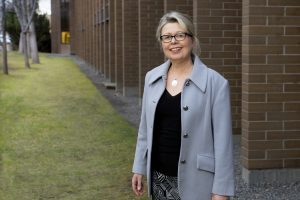By Susan Duncan, BSN, MScN, PhD, UVic School of Nursing Director
“Knowledge is a social memory, a connection to the past; and it is social hope, an investment in the future. The ability to create knowledge and put it to use is the adaptive characteristic of humans. It is how we reproduce ourselves as social beings and how we change – how we keep our feet on the ground and our heads in the clouds.” (Menand, 2010, p. 13)
It is my privilege to join this dynamic School of Nursing as its director in its 40th year. In this relatively short period of time, the school is recognized for a remarkable legacy of contributions to nursing education, research, practice and health. In particular, the school is a leader in collaborating with others in many different organizations and approaches to realize its vision for nursing, and for research that is relevant and accessible to those who need it. This issue of the Communiqué is an opportunity to celebrate significant accomplishments and mark a point in time to consider ways in which the UVic SoN will evolve to meet society’s needs for nurses and nursing knowledge in this new millennium. The school embarks on a new phase with its valued partners in nursing education and scholarship – Aurora College in Northwest Territories, College of the Rockies, Selkirk College and Camosun College in British Columbia.
Recently, faculty, students and partners participated in World Cafes to develop a clear vision of where the school will DARE to go in the next decade. The Commission on Truth and Reconciliation Calls to Action provides an opportunity to enrich pedagogy and relationships while learning and valuing Indigenous knowledges for health. Faculty affirm the vision of the school as an exemplar of the UVic Edge – where students experience dynamic learning, in extraordinarily rich practice and community settings, and work with others for vital impact on health. Faculty researchers participate with students and the public in socially engaging ways including social media innovation and community events.
Faculty teaching and research address areas identified as relevant today and for decades to come – palliative care, pain management, aging, indigenous health and knowledge, public health, care delivery models, pedagogy, simulation and inter-professional practice, housing and homelessness, substance use and harm reduction – to name a few. Recently, faculty achieved the designation of a Joanna Briggs affiliate institute where teams synthesize and disseminate research findings for application to relevant and pressing nursing practice and health system problems. Another team of researchers has identified competencies required of researchers at various stages of their career development. This research competency pathway is gathering international interest and is accessible to all.
Educating nurses will continue to be a most pressing need including the development of new teachers – nurses who are highly relational and skilled in the acquisition and use of a variety of forms of knowledge to inform care, health systems, and advocacy for conditions of health. Faculty will continue to lead innovations in nursing curricula including research informed pedagogy to prepare students with knowledge and skill for practice in specialized points of care, complex health systems, and develop primary and community care systems. These students will push the boundaries of how technology can be harnessed to produce knowledge for health impact.
Needless to say, the future of nursing research lies with our students. Faculty inspire research interests among undergraduate students by mentoring them as research team members, securing JCURAs, and sharing current research findings to better inform people and communities about the health issues that matter to them. Most important, faculty model collaborative relationships in their approach to research, approaches critical to ensuring that findings are off the shelf and making a difference to lives of people who need them.
The preparation of graduate students is key to ensuring that society will benefit from nursing knowledge in the future. At UVic, Masters students are prepared for advanced practice including NP roles and to lead nursing practice in future care delivery models. A dual Master of Nursing and / Health Information Science program, uniquely the first of its kind, prepares graduates to advance health information systems that reflect authentic needs for care and knowledge syntheses.
12 students entered the PhD Nursing program this year. Their presence inspires all of us as they bring their practice expertise and research interests. These interests mark the future of the perinatal health of refugees, extending the Nurse Practitioner role, cultural sensitivity and the role of Indigenous knowledge in health, gender variance and social justice, caregivers’ experiences with medically assisted dying, cultural safety in nursing education, immigrant health, dementia care and primary care of seniors in their communities. Students learning and insights will spur innovations in how researchers approach their questions. Faculty working with students and communities will sustain the school’s vital impact on health for the next 40 years.

From the 2016 Fall Communiqué — 40th Anniversary Issue
Recent Comments